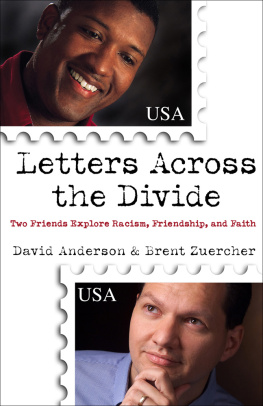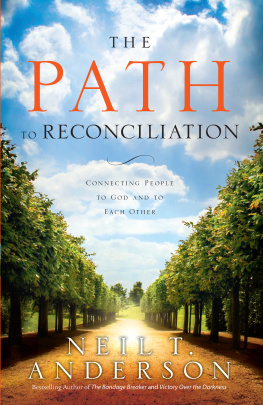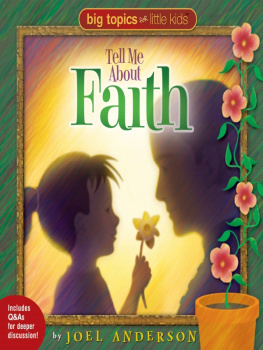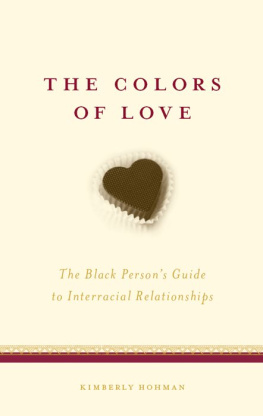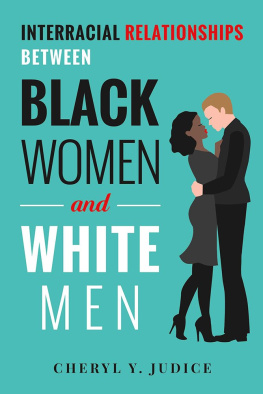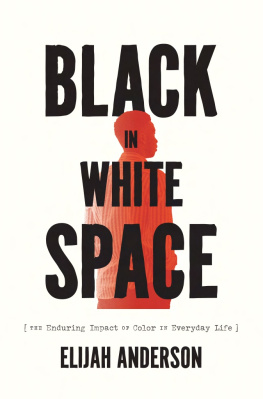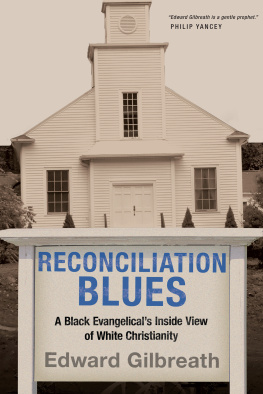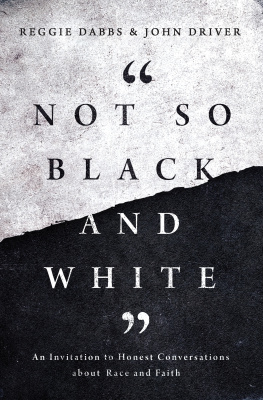David Anderson - Letters Across the Divide: Two Friends Explore Racism, Friendship, and Faith
Here you can read online David Anderson - Letters Across the Divide: Two Friends Explore Racism, Friendship, and Faith full text of the book (entire story) in english for free. Download pdf and epub, get meaning, cover and reviews about this ebook. year: 2001, publisher: Baker Publishing Group, genre: Politics. Description of the work, (preface) as well as reviews are available. Best literature library LitArk.com created for fans of good reading and offers a wide selection of genres:
Romance novel
Science fiction
Adventure
Detective
Science
History
Home and family
Prose
Art
Politics
Computer
Non-fiction
Religion
Business
Children
Humor
Choose a favorite category and find really read worthwhile books. Enjoy immersion in the world of imagination, feel the emotions of the characters or learn something new for yourself, make an fascinating discovery.
- Book:Letters Across the Divide: Two Friends Explore Racism, Friendship, and Faith
- Author:
- Publisher:Baker Publishing Group
- Genre:
- Year:2001
- Rating:4 / 5
- Favourites:Add to favourites
- Your mark:
- 80
- 1
- 2
- 3
- 4
- 5
Letters Across the Divide: Two Friends Explore Racism, Friendship, and Faith: summary, description and annotation
We offer to read an annotation, description, summary or preface (depends on what the author of the book "Letters Across the Divide: Two Friends Explore Racism, Friendship, and Faith" wrote himself). If you haven't found the necessary information about the book — write in the comments, we will try to find it.
A black minister and a white businessman candidly discuss the obstacles, stereotypes, and sins that inhibit interracial reconciliation. Provocative and honest.
Letters Across the Divide: Two Friends Explore Racism, Friendship, and Faith — read online for free the complete book (whole text) full work
Below is the text of the book, divided by pages. System saving the place of the last page read, allows you to conveniently read the book "Letters Across the Divide: Two Friends Explore Racism, Friendship, and Faith" online for free, without having to search again every time where you left off. Put a bookmark, and you can go to the page where you finished reading at any time.
Font size:
Interval:
Bookmark:
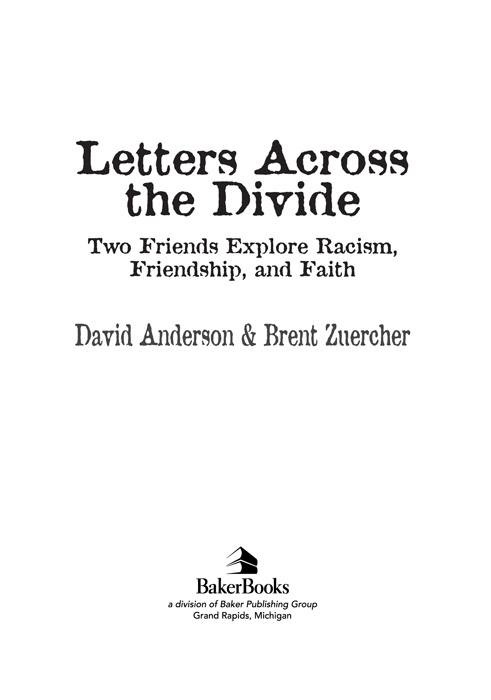
2001 by David Anderson and Brent Zuercher
Published by Baker Books
a division of Baker Publishing Group
P.O. Box 6287, Grand Rapids, MI 49516-6287
www.bakerbooks.com
Ebook edition created 2012
All rights reserved. No part of this publication may be reproduced, stored in a retrieval system, or transmitted in any form or by any meansfor example, electronic, photocopy, recordingwithout the prior written permission of the publisher. The only exception is brief quotations in printed reviews.
ISBN 978-1-5855-8497-0
Library of Congress Cataloging-in-Publication Data is on file at the Library of Congress, Washington, DC.
Scripture quotations marked NIV are taken from the HOLY BIBLE, NEW INTERNATIONAL VERSION. NIV. Copyright 1973, 1978, 1984 by International Bible Society. Used by permission of Zondervan Publishing House. All rights reserved.
Scripture quotations marked NKJV are taken from the New King James Version. Copyright 1979, 1980, 1982 by Thomas Nelson, Inc. Used by permission. All rights reserved.
Scripture quotations marked KJV are taken from the King James Version of the Bible. The authors express appreciation for permission to reprint:
Blessed Are the Peacemakers. This article first appeared in the June 1994 issue of Moody Magazine. It is reprinted with permission.
For Many Blacks, Simpson Case Is, Indeed, about Race by Clarence Page. Tribune Media Services, Inc. All rights reserved. Reprinted with permission.
Southern Baptists Approve Apology for Longtime Racism. Reprinted with permission of the Associated Press.
Southern Baptists Offer an Apology. Copyright 1995, USA Today. Reprinted with permission.
On pages 6566, excerpt from Blinded by the White, by Ray Hartman, Nov. 5, 1997, The Riverfront Times.
Contents
Prologue
A Note to the Reader from David
I n recent years there has been an increasing focus within the church on racial reconciliation. The mere fact that you are reading this reveals that you are at least mildly curious about what racial reconciliation is really all about and what implications it has for your life. There are many ways of approaching this emotionally charged topic and as the senior pastor of a multicultural church, I have seen my congregation use several. The least effective is of course a lecture where the speaker presents his perspective and the audience passively listens and then goes home. The most effective way of dealing with the many facets of racial reconciliation is through individual relationships among members of different races. Whether it is in a small group or a one-on-one between two people, some form of personal interaction is essential.
I am committed to consistently lifting up the core value of racial reconciliation before my congregation. This is a significant part of my everyday life. I understand, though, that not everyone has my same level of interest or devotion to this issue. You may have little commitment to racial reconciliation but perhaps just a seed of interest. My hope is that by allowing you to essentially eavesdrop on a written conversation between a close personal friend of mine and me, the seed within you will be watered and Christ will grow that seed as He consistently draws you to Himself and toward others.
Before you read on, I think it would be helpful if you understood the context in which the following conversation took place. I am African American and Brent is white. We first met at the singles group I was pastoring as an intern at a large predominately white church in the northwest suburbs of Chicago. Our acquaintance turned into a friendship through the experience of the small group. As friends, we laughed together, prayed together, played basketball together, worshiped together, served together, and talked too late into the night. We know the dirt on each other, we appreciate the strengths of each other, and we genuinely enjoy each others company.
On completing my internship, I moved from Chicago to Columbia, Maryland, to plant a multicultural church. Brent is a certified public accountant and through our friendship he had demonstrated that he was a person I could trust. Therefore I asked Brent to help me get the church started in the right direction fiscally and legally. Brent agreed to be our treasurer but not to relocate from Chicago. One of the reasons he decided not to move to Columbia was that he had unresolved issues and unanswered questions about race. As a result, during Bridgeway Community Churchs infancy, Brent and I corresponded, addressing his questions and issues.
The dialogue you are about to read was our personal and real conversation about race. It reflects our personalities and experiences and is not necessarily the conversation you would have. Personal aspects of our lives were discussed in other conversations, either over the phone or face-to-face. The letters you will read were simply the vehicle we used to discuss this one particular topic. Why did we do this via letters? Since we didnt live in the same town, we couldnt get together and talk, and letters were cheaper than hours and hours and hours of long-distance phone calls. Letters also gave us time to process our responses and write and rewrite our thoughts.
Let me caution you that our conversation is in no way a substitute for the reality of your need to engage in your own conversation with someone of another race. My relational connection with Brent was the foundation of our ability to converse with openness and honesty about such matters. We encourage you to find a safe cross-cultural relationship where you can explore these matters in greater and more personal depth. Do not allow yourself to live vicariously through our conversation, deceiving yourself and thinking that you too have journeyed down the road of reconciliation. The journey is not a vicarious one but must be a personal experience. Our desire is that these letters will inspire you to begin your own journey. You will find questions in the appendix that will assist you in having your own conversation, whether one-on-one or in a small group.
You will notice that some of the letters have footnotes, offering additional guidance or clarification as to what we were thinking when we wrote. Since the time these letters were written, our views on certain points may have changed slightly, so we have also inserted footnotes to amend or offer a more rounded view, without changing the content of the letter as it was originally written.
The reader should feel free to go directly to any letter that interests him or her. The conversation is an ongoing one from beginning to end, but each group of letters is a conversation from beginning to end as well.
Allow me to make this disclaimer at the very beginning. The conversation that Brent and I had is a real one that uses broad statements. We do not see ourselves as the absolute voice for our respective groups, although in the privacy of our conversation from our own experiences and opinions, we may view ourselves as speaking for those groups. Although we do not need to give the details, from the time Brent and I started our conversation until today there have been bumps and diversions, hard feelings, apologies, and forgivenessthat is part of any relationship and friendship. By the end of the last letter, you will have learned how Brent and I moved along the continuum of racial reconciliation.
I need to make one other point. There are three kinds of racism: individual, institutional, and indirect racism. Individual racism is the personal view one holds, affecting people on an individual level. Institutional racism is a systemic and sociological condition that creates an environment whereby particular kinds of people are excluded from the positive norms of that institution. Indirect racism could be individual, institutional, or the integration of both. However, indirect racism is not a targeted form of racism. It is better described as neglecting certain kinds of people from the positive norms of an institution or society as opposed to creating an environment of exclusion.
Next pageFont size:
Interval:
Bookmark:
Similar books «Letters Across the Divide: Two Friends Explore Racism, Friendship, and Faith»
Look at similar books to Letters Across the Divide: Two Friends Explore Racism, Friendship, and Faith. We have selected literature similar in name and meaning in the hope of providing readers with more options to find new, interesting, not yet read works.
Discussion, reviews of the book Letters Across the Divide: Two Friends Explore Racism, Friendship, and Faith and just readers' own opinions. Leave your comments, write what you think about the work, its meaning or the main characters. Specify what exactly you liked and what you didn't like, and why you think so.

